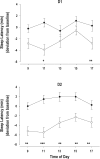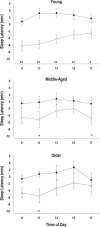Age-related reduction in daytime sleep propensity and nocturnal slow wave sleep
- PMID: 20175405
- PMCID: PMC2817908
- DOI: 10.1093/sleep/33.2.211
Age-related reduction in daytime sleep propensity and nocturnal slow wave sleep
Abstract
Objective: To investigate whether age-related and experimental reductions in SWS and sleep continuity are associated with increased daytime sleep propensity.
Methods: Assessment of daytime sleep propensity under baseline conditions and following experimental disruption of SWS. Healthy young (20-30 y, n = 44), middle-aged (40-55 y, n = 35) and older (66-83 y, n = 31) men and women, completed a 2-way parallel group study. After an 8-h baseline sleep episode, subjects were randomized to 2 nights with selective SWS disruption by acoustic stimuli, or without disruption, followed by 1 recovery night. Objective and subjective sleep propensity were assessed using the Multiple Sleep Latency Test (MSLT) and the Karolinska Sleepiness Scale (KSS).
Findings: During baseline sleep, SWS decreased (P < 0.001) and the number of awakenings increased (P < 0.001) across the 3 age groups. During the baseline day, MSLT values increased across the three age groups (P < 0.0001) with mean values of 8.7 min (SD: 4.5), 11.7 (5.1) and 14.2 (4.1) in the young, middle-aged, and older adults, respectively. KSS values were 3.7 (1.0), 3.2 (0.9), and 3.4 (0.6) (age-group: P = 0.031). Two nights of SWS disruption led to a reduction in MSLT and increase in KSS in all 3 age groups (SWS disruption vs. control: P < 0.05 in all cases).
Conclusions: Healthy aging is associated with a reduction in daytime sleep propensity, sleep continuity, and SWS. In contrast, experimental disruption of SWS leads to an increase in daytime sleep propensity. The age-related decline in SWS and reduction in daytime sleep propensity may reflect a lessening in homeostatic sleep requirement. Healthy older adults without sleep disorders can expect to be less sleepy during the daytime than young adults.
Figures




References
-
- Foley DJ, Monjan AA, Brown SL, Simonsick EM, Wallace RB, Blazer DG. Sleep complaints among elderly persons: an epidemiologic study of three communities. Sleep. 1995;18:425–32. - PubMed
-
- NIH State-of-the-Science Conference Statement on manifestations and management of chronic insomnia in adults. NIH Consens State Sci Statements. 2005;22:1–30. - PubMed
-
- Groeger JA, Zijlstra FR, Dijk DJ. Sleep quantity, sleep difficulties and their perceived consequences in a representative sample of some 2000 British adults. J Sleep Res. 2004;13:359–71. - PubMed
-
- Kamel NS, Gammack JK. Insomnia in the elderly: cause, approach, and treatment. Am J Med. 2006;119:463–9. - PubMed
Publication types
MeSH terms
LinkOut - more resources
Full Text Sources
Other Literature Sources

